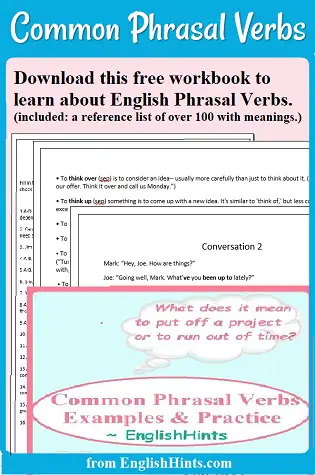Common Phrasal Verbs
Do you want to understand common phrasal verbs better? Do you wonder why English speakers use so many of them when they could use one-word verbs that have the same meaning? Here's a brief explanation and then a free phrasal verb workbook you can download to learn more and keep as a handy reference.
English speakers like phrasal verbs because they seem more conversational than many of our one-word verbs (especially those that come from Latin.)
If you want to speak English the way native speakers do, one of the best ways is to start using some of these common verb phrases.
Phrasal verbs use very basic English verbs like 'come,' 'go,' 'give,' 'get,' or 'look.'
They add one or two prepositions (In, out, off, on, for, with, up, to, etc.) to give a meaning that might-- or might NOT-- be directly related to the meaning of the verb itself.
"To go out with someone" is simple: it means to leave your home in the company of someone you want to know better. (It's not in this workbook. I tried to focus on expressions that aren't so obvious.)
Phrasal Verbs with Less-Obvious Meanings
Consider the different meanings of a few phrasal verbs using 'get.'
To ‘get along with’ someone means you work well with them—a good thing. However, ‘to get away with something’ means to do something illegal or wrong without punishment.
‘To get rid of’ something is to discard it, and to ‘get over’ an illness means to recover from it.
How many of these could you guess from the individual words?
As you can see, many phrasal verbs have developed meanings that are not at all obvious from the individual words of the phrase. The workbook lists just over 100 of the most common (but not obvious) phrasal verbs, with their meanings and usually with example sentences.
(If you just want to check the meaning of a phrasal verb or two that you have heard, see List of English Phrasal Verbs, A-M (from 'to back out' through 'to make up' (with three very different meanings) or List of Phrasal Verbs 2: P-W ('to pass away' through 'to watch out.')
These and many more expressions are also in this workbook, but it includes a lot more explanation and practice-- probably too much if you don't need to talk with English speakers often.
If you do, and find many of these expressions confusing, it is probably worth the time to learn how we use phrasal verbs in English conversations and look over the more common ones.
Without understanding them you may have real trouble understanding casual (or workplace) conversations in English!
Memorizing phrasal verb lists has limited value. It's hard to recognize or use them in practice! (However, lists can be good reminders of expressions you have already learned-- or ways to check the meaning of a new phrase you hear.)
The best way to learn them—and get more familiar with conversational English-- is to listen to conversations that use them, a few at a time, in context.
That’s why the Common Phrasal Verbs workbook begins with several complete conversations demonstrating phrasal verbs, and why most of the phrasal verbs listed include at least one sentence to demonstrate how they can be used.
What's in the Common Phrasal Verbs Workbook?
It starts with four conversations that illustrate how English speakers use some common phrasal verbs. After each conversation there's a matching practice so you can connect these expressions with single verbs that mean the same thing.
Then there's a page that explains separable and inseparable phrasal verbs. It's an important grammar point if you want to try using them yourself. It can be complicated, but there is a simple way to avoid using them incorrectly.
The main section of the workbook is an alphabetical reference list giving about 100 phrasal verbs, their meanings and examples of how they are used. Each also identifies 2-word verbs as either separable or inseparable. (All 3-word or more verb phrases are inseparable.)
Finally, there's a simple quiz to practice some of the most common phrasal verbs of all.
Note: If you sign up, you should get an email soon asking you to "confirm your subscription." (This ensures no one else signed you up without your permission.) If you don't see the email, check your spam folder.
When you click "Yes," it should take you to a short page with a link to download your pdf. If you have any questions, please contact me via a link in the blue section at the bottom of this page. I hope you find it helpful!
Home > Common Idioms > Common Phrasal Verbs
Didn't find what you
needed? Explain what you want in the search box below.
(For example, cognates, past tense practice, or 'get along with.') Click to see the related pages on EnglishHints.
| site search by freefind | advanced |


